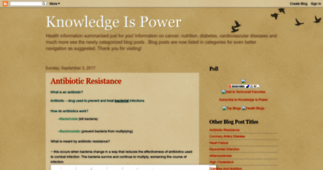Knowledge Is Power
Enter a key term, phrase, name or location to get a selection of only relevant news from all RSS channels.
Enter a domain's or RSS channel's URL to read their news in a convenient way and get a complete analytics on this RSS feed.
Unfortunately Knowledge Is Power has no news yet.
But you may check out related channels listed below.
[...] Heart failure doesn’t suggest that the heart has completely stopped or is in the process of stopping [...]
[...] life-threatening it is and the more complications may result. Some possible complications are heart failure, as the heart muscle becomes unable to pump an adequate amount of blood to the rest of the [...]
[...] heart are affected and there’s a possibility of experiencing chest pain (angina) or a heart attack (myocardial infarction). Transient ischemic attack or stroke arises when arteries supplying [...]
[...] A may be associated with an increased risk for cardiovascular diseases, including CAD and heart attack. Diagnosis One or more of the following diagnostic tests may be performed to determine whether [...]
[...] higher lipid (fats and oils) levels in blood which contributes to the progression of a heart attack. Generally, diabetics should limit sweets, eat less fat, limit alcohol usage, eat often in [...]
[...] in dead tissue in a matter of hours. The most common site of atherosclerosis, leading to a heart attack, is the anterior interventricular branch of the left coronary artery, which supplies the left [...]
[...] Computed Tomography (EBCT) – finds and measures calcium deposits in and around the coronary arteries. This test is not routinely done to diagnose coronary artery disease because of uncertainty [...]
[...] . It is most commonly caused by coronary insufficiency resulting from atherosclerosis of the coronary arteries. In this event, a coronary artery may become blocked by a blood clot. Blockage of the [...]
[...] , such as dizziness, sudden numbness or weakness. Obstruction of arteries to the heart (coronary arteries) may cause symptoms of a heart attack, e.g. angina pectoris (chest pain which is normally [...]
[...] (relating to blood vessels) disease of the heart characterized by changes to the myocardium (heart muscle) due to inadequate or interrupted blood flow to the heart muscle. It is most commonly caused [...]
[...] ). Blood clots can partially or completely block blood flow. Reduced blood flow to the heart muscle can cause angina (chest pain or discomfort usually relieved by rest) or a heart attack ( [...]
[...] , loss of appetite, weight gain or loss. Causes and Risk Factors Conditions which damage the heart muscle (myocardium) or make it work too hard to pump sufficient blood to where it is needed can cause [...]
[...] Myocardial Infarction is a vascular (relating to blood vessels) disease of the heart characterized by changes to [...]
[...] and there’s a possibility of experiencing chest pain (angina) or a heart attack (myocardial infarction). Transient ischemic attack or stroke arises when arteries supplying blood to the brain [...]
[...] can cause angina (chest pain or discomfort usually relieved by rest) or a heart attack (myocardial infarction). It is also possible to develop shortness of breath or extreme fatigue on exertion due to [...]
[...] Gestational diabetes is a type of diabetes that only pregnant women develop. Gestational diabetes affects around 4% of all pregnant women. In gestational diabetes, the woman's blood sugar [...]
[...] risk factors are: being overweight; family history; inactivity; and women who developed gestational diabetes during their pregnancy. In terms of treatment, some affected by type 2 diabetes can keep [...]
[...] levels lead to atherosclerosis as cholesterol accumulates in the arteries causing narrowing of blood vessels. Dietary intake of polyunsaturated fatty acids help in the transport and metabolism of [...]
[...] Myocardial Infarction is a vascular (relating to blood vessels) disease of the heart characterized by changes to the myocardium (heart muscle) due to [...]
[...] progression of atherosclerosis begins when tears or fatty streaks in the inner lining of blood vessels attract monocytes (type of white blood cell) and stimulate the cellular immune response. [...]
[...] tissues. Vasoconstrictor factors refer to those hormones which cause constriction of blood vessels. The sympathetic nervous system is a part of the nervous system which responds to ‘ [...]
[...] , things like particular medicines, vaginal infections and diseases such as diabetes, high blood pressure and cancer may effect sexual dysfunction. Most importantly, hormonal changes in a woman can [...]
[...] the inner lining of the coronary artery may be as a result of: · Diabetes · High blood pressure · High cholesterol · Radiation therapy to the chest, which may be used for [...]
[...] the blood. The major causes of heart failure are coronary artery disease (CAD), diabetes, high blood pressure (hypertension). Some other causes of heart failure include, but are not limited to: [...]
[...] . Smoking may also lower HDL cholesterol levels, which is the 'good cholesterol'. High blood pressure can damage arteries, contributing to the rate of fatty deposit accumulation. High blood [...]
[...] Heart failure doesn’t suggest that the heart has completely stopped or is in the process of stopping [...]
[...] life-threatening it is and the more complications may result. Some possible complications are heart failure, as the heart muscle becomes unable to pump an adequate amount of blood to the rest of the [...]
Related channels
-
Knowledge Is Power
Health information summarised just for you! Information on cancer, nutrition, diabetes, cardiovascular diseases and much...
-
Techdhami.com
Helping You Choose the Best in Tech
-
Knowledge Is Power
Use It Wisely...

